
|
| Erin Levenstein andTiffany Freeman |
Greek Life
The University of Illinois has the largest Greek System, with nearly a quarter of the campus involved. There are six nationally Jewish houses, all of which at U of I also have non-Jewish members. The Greek at U of I are not afraid of Hillel. In fact many of our Friday Night regulars are members of Greek Houses.
Alpha Epsilon Pi: 110 E. Chalmers, Champaign (2nd and Chalmers) 367.1953
President- Adam Smith
Pi Lamda Phi: 1105 S. First St., Champaign 384.6225
President - Ryan Ebner
Sigma Alpha Mu: 301 E. Armory, Champaign (3rd and Armory) 344.2291
President Jordan Gottlieb
Zeta Beta Tau: 907 S. Fourth, Champaign (Fourth and Daniel) 328.9300
President - Jeff Katz
Alpha Epsilon Phi: 904 S. Third, Champaign (Third and Daniel) 531.0442
President Erin McKavanagh (not Jewish)
Sigma Delta Tau: 1104 W. Nevada, Urbana (between Goodwin and Lincoln) 337.4000
President Lauren Horowitz
*Alpha Chi Omega 904 S. Lincoln, Urbana, has a considerable number of Jewish girls in the house. A good contact person would be Jenny Levin.
Why go Greek?
There are many reasons why people decide to join a House. Some choose it because of the social networking, the scholarship, leadership, philanthropy/ community service, friendship and sister/brotherhood, social, athletics. Some choose it because they are a legacy, meaning that someone in their family was a member of that house. The decision to go Greek is not necessarily an easy one, however the decision to join a Jewish charter over a non-Jewish one is often more difficult.
People go Jewish because they already know many people in that Fraternity/sorority, either from high school, youth groups, family friends or synagogue membership. They feel a greater sense of belonging, and that is what many incoming freshmen are looking for in joining a house. Involvement in a Jewish house also satisfies the parents desire for their child to socialize with other Jews. Students often do not feel any need to venture outside of their house for anything Jewish, with the exception of religious services and Holiday celebration.
What is Rush?
Rush of men and women differ greatly. Men generally wine and dine their potential members, hosting them at parties, taking them to restaurants and inviting them to play sports and participate in house activities. This is done so that the rushee becomes familiar with the chapter members and the members get to know the rushee. Women have a much more elaborate and formal rush experience. They participate in a series of events, gaining in formality at each event. The final invite is the time when each woman has to decide which house when will join, if any at all. This process is also based on eliminations from both the sorority and the rushee, in attempt of narrowing the list to only a few at the end.
The Fall 2002 Recruitment Dates and times are (for women):
Open House - Friday Aug. 30th, 6pm-10:30pm
Open House-- Saturday Aug. 31st- 11am-2:20 pm, 6-9:20pm
First Invite - Sunday Sept. 1st, 1-4:30pm, 6:30-10pm
Second Invite - Monday Sept. 2nd, 4-8:45pm
Third Invite - Friday Sept. 13th, 7-10:40pm
Bid Distribution -- Sunday, September 15th: 10:30am and to conclude by 3pm.
Jewish Greek Council (JGC)
The great switch over (from one to many). The Jewish Greek Council has fluctuated over the past few years between an actual board and one person. At the beginning of the spring semester a board was put into place, one that the students will take seriously. It was my goal to create something that would survive the turbulence of frequent change. This year we created a constitution, distinct board positions, as well as a strong base of student participation.
Mission statement: The strength of the Jewish community at the University of Illinois is a result of Jewish involvement in every aspect of campus life. The Greek System is no exception. Jewish Greek Council is an organization that brings together Jewish students who are members of sororities and fraternities. JGC sponsors social action projects, hosts parties and serves as a Jewish community for students in Greek life.
JGC's primary goal is to unite Jewish students in the Greek System. However, any member of the Greek System is welcome to join Jewish Greek Council. The Exec Cabinet worked hard this year to reach out to the Jews in Non-Jewish Houses. The best way to do this is have the students do it themselves. They know whom these people are, where the live and what house they are. Have them invite them to a program and most often these students feel welcome and glad to be doing something Jewish.
Website: http://www.uiuc.edu/ro/jgc/index.htm
Exec board: President: Noah Frank (AEPi)
Nafrank@uiiuc.edu
Public Relations: Diana Kogan (SDT)
dkogan@uiuc.edu
Social: Mara Brin (AEPhi)
marabrin@uiuc.edu
Treasure: Tiffany Freeman (SDT)
tlfreema@uiuc.edu
Philanthropy/ Scribe: Erin Levenstein (SDT)
levenstn@uiuc.edu
There are house representatives from each house:
Rosen Kathy karosen@suiuc.edu AEPhi
Walner Marni mwalner@uiuc.edu AEPhi
Klein Ryan rklein@uiuc.edu AEPi
Levy Judie jlevy1@uiuc.edu AOPi
Cohen Aaron ascohen@uiuc.edu PLPhi
Drobney Michael drobny@uiuc.edu SAM
Fine Jeremy jmfine@uiuc.edu SAM
Baron Matt Mbaron@uiuc.edu ZBT
Kole Freddie kole@uiuc.edu ZBT
Schnitzer Bryan schnitz2@aol.com ZBT
Zuckerman Alan zuckermn@uiuc.edu ZBT
Noah Frank has a list of all people who receive JGC emails. I believe there are nearly 100 people on the list.
Meetings run somewhat smoothly. You will need to guide them alone, because conversations tend to get long. I suggest setting a time limit on each thing that needs to get discussed, people get antsy after about an hour. We held meetings every other week one only exec board and then one for anyone who wanted to attend. Dont let Noah Frank make exclusive decisions as president, each board position has the same clout.
It was the goal of The JGC to host a few programs each semester, like a philanthropy event or fundraiser, a few social programs and a religious event (i.e. Greek Shabbat or Greek Seder)
Program summary:
Greek Shabbat: The goal of Greek Shabbat is to assemble a great number of Jewish students involved in the Greek system to participate in a traditional Shabbat dinner together with their peers. The Jewish Greek Council (JGC), consisting of members from each of the Jewish-affiliated houses as well as other Jewish students in Greek houses, usually hosts and plans this event.
In the past, there has been an attendance of nearly 200 students, who enjoy a five-course meal complete with Kiddush wine and Challah. It would be ideal not to charge the students for this event. Traditionally they have paid $5, however, it is from my experience, the greatest attendance comes at events that have little or no cost.
Greek Shabbat is an opportunity for the Jewish Greek students to celebrate Shabbat together, as well as for their non-Jewish friends to experience Shabbat. It is usually held somewhere besides Hillel, however that can get expensive and the students dont seem to think that having it at Hillel is a bad thing. It is important that the students get involved in the planning of this event, because it requires much effort. This past year we did it in the fall at Hillel, it was nicely decorated, and I requested special food to be prepared (most of which I cooked myself).I wanted the evening to be special, because for most of these students, it was their first time at Hillel. About 90 students attended, said Kiddush and HaMotzi and enjoyed a meal. It was an early dinner so that the people who wanted to pray, could enjoy dinner and make it to services as well. The charge for the meal was $2.00 so students could pay for part of it.
Greek Seder: Greek Seder is similar to Greek Shabbat, except it is during Pesach. I had hoped to do it in tent, however it was still rather chilly outside. We hosted it at the AEPhi house as has been done in the past. All food was brought from Hillel, even special utensils were brought to insure the kashrut was observed. We had an overwhelming amount of people attend, that we didnt account for prior to the event so we didnt have enough chairs and food for everyone. Tiffany Freeman and I went back to Hillel twice to get food, and the AEPi guys helped out by bringing tables and chairs to the house. It was a little crowded, but with a little wine, everyone was happy. We prepared a Seder that was student led and super quick. Most students leave after the meal, but some stayed to sing songs. I suggest that for next year, you get an almost accurate account of how many people will attend. I would do this by charging a certain amount for people who sign up early; those who sign up days before or the day of will have to pay a few dollars extra. The problem with AEPhi is that it can hold only about 85 people comfortably, and the space was much to small for the 150 people that attended. Ideas of places to have it (this goes also for Greek Shabbat): a tent outside Hillel, The Union, Hotel or Convention Center, the front room of the Sammy house is pretty big and without the couches would probably fit about 120, but it is messy there. Additionally, having a themed seder or a game, would keep people interested for longer and encourage greater participation. When having the seder, assign people parts before hand so that it runs smoothly.
*Whenever you have something at a house- DO NOT LET THE PRESS INSIDE, ESPECIALLY WITH CAMERAS! All wine that goes in has to be accounted for and the proper people have to be informed that it is wine being used for a religious event.
One more great point: after Greek Seder, they guys of Sammy and AEPi decided to do a seder on their own, with other guys in their house the next night.
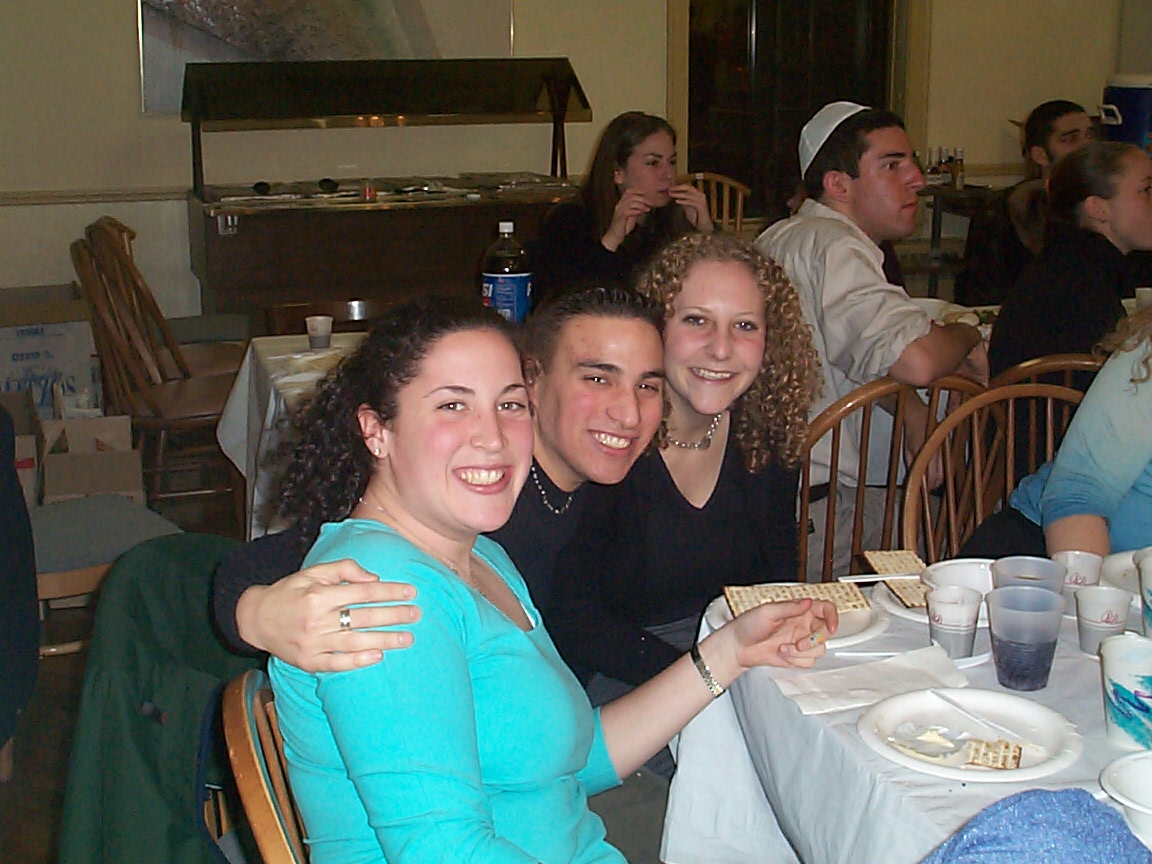
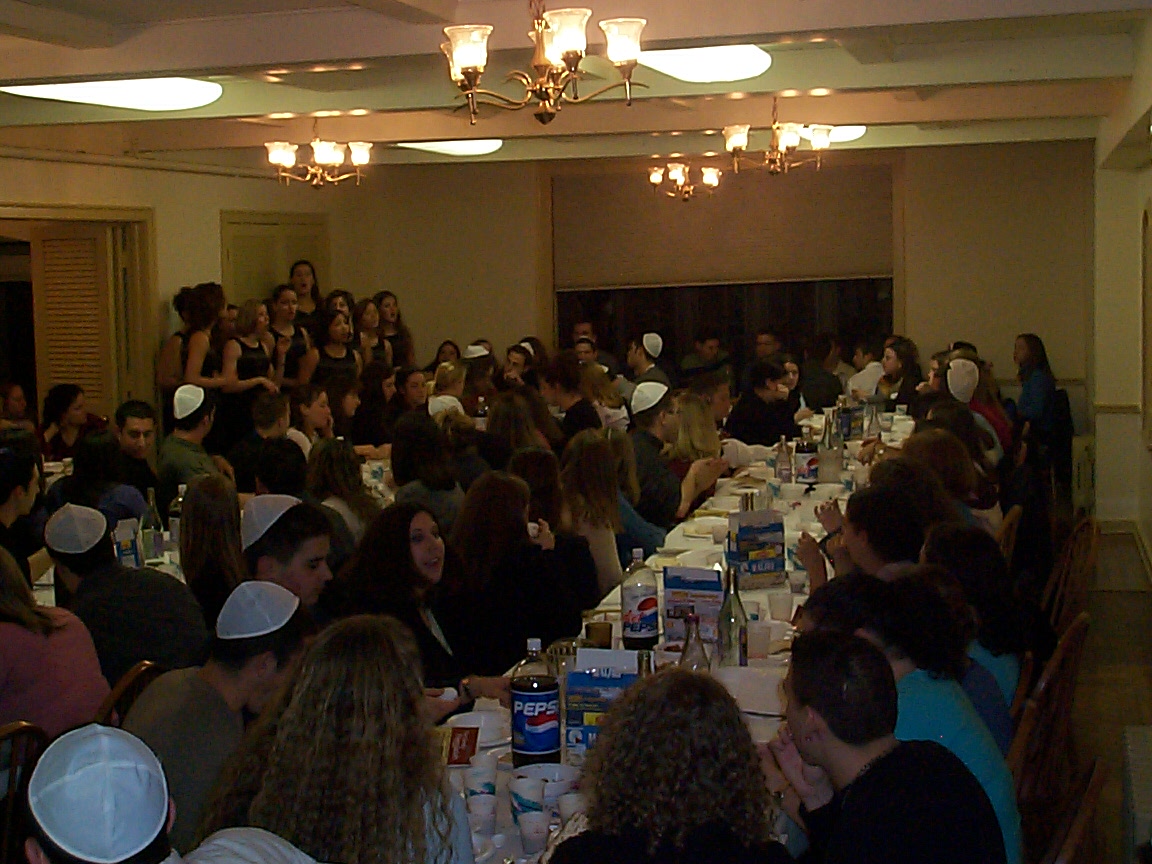
Professor Dessert: Professor Dessert was something that was started this year. It is still in the inaugural process of becoming a stabilized program, which is what JGC would really like it to be. It is hosted by the JGC, usually at AEPhi, but can be anywhere depending on the number of people who attend. It is a fairly easy program to plan. The invitations should go out to the students to give their professors about a month in advance. Some students will be really excited about this event and then not show up (dont be upset when the students forget to take the invitations to class), they will regret it later when others are thankful they made the effort. It is a great opportunity for the students and the Professors to get to know each other on a non-academic level. Some students will use this program for selfish means (improving their grade, meeting a good looking educator), but that cant be helped. There are students that generally want to know their professors better. You can purchase the food at Schnuks and Sams Club, which has great cheesecake and little dessert trays. I tried to make the house look a bit nicer with tablecloths, flowers or center decorations that are not too expensive. Select one student to greet people at the door and bring them into the room. The dessert should last for about 1.5 hours. One student was asked by a professor to join his advanced seminar that was impossible to get into, because of this professor dessert.
Advice: Try to keep the girls in the house that are not attending out of the room until the program is over. Without a doubt they will be disruptive and eat what you brought.
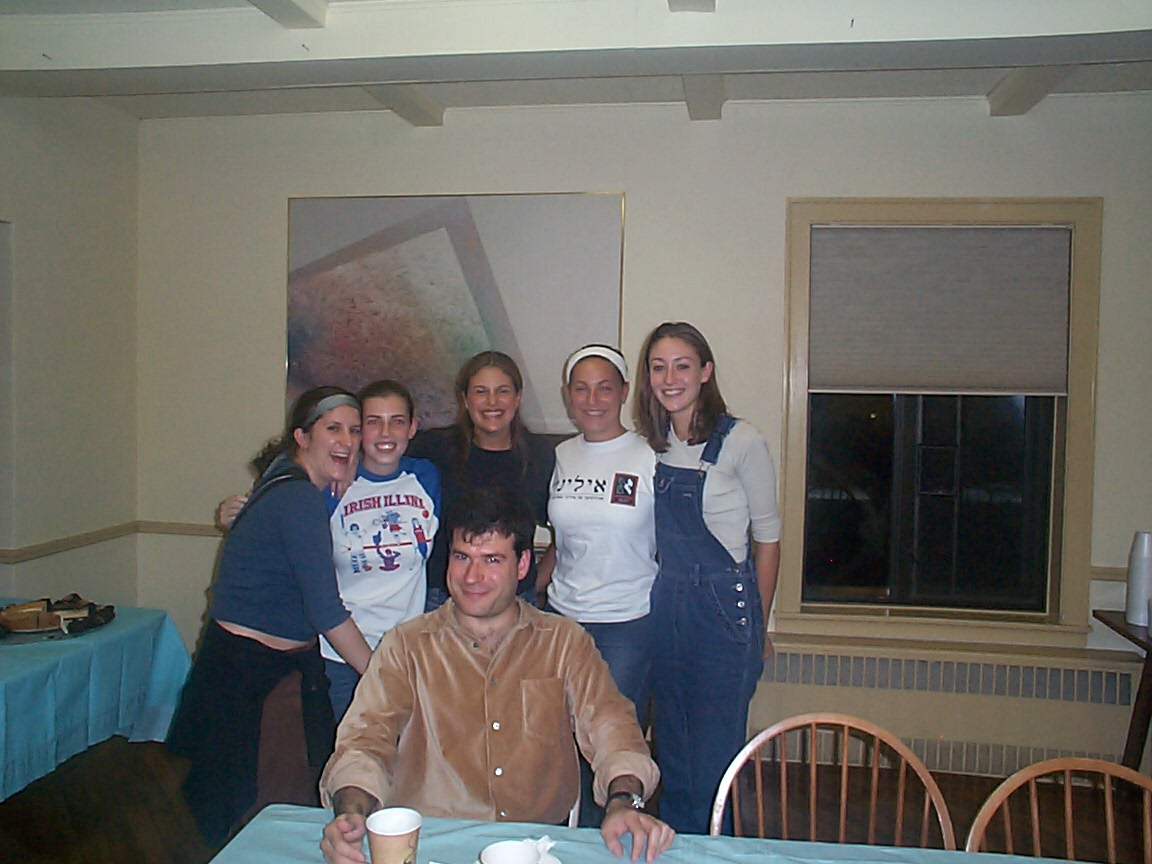
JGC BBQ: Also an easy program to plan, and everyone wants free food! I had it at Hillel this year because it needed to be inside, however if it were nice outside (maybe a program for the beginning of the year) I would have it in the lot between ZBT and the AEPhi house. There are many houses in that area, and it is out if Hillel which is always good. Frat Park is another place to have it. Order/buy the food: burgers, dogs, veggie patties, chips, potato saladetc., advertise, have people to help and viola! You are good to go! A supurb addition would be entertainment- Brad and Rob from AEPi, Sammy boys play guitar (Todd Kessler, Matt Engle) I am sure that you could find an array of people to participate.
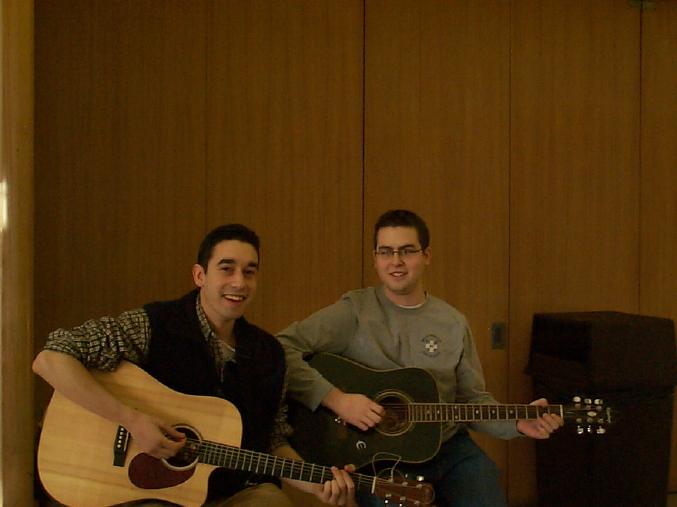
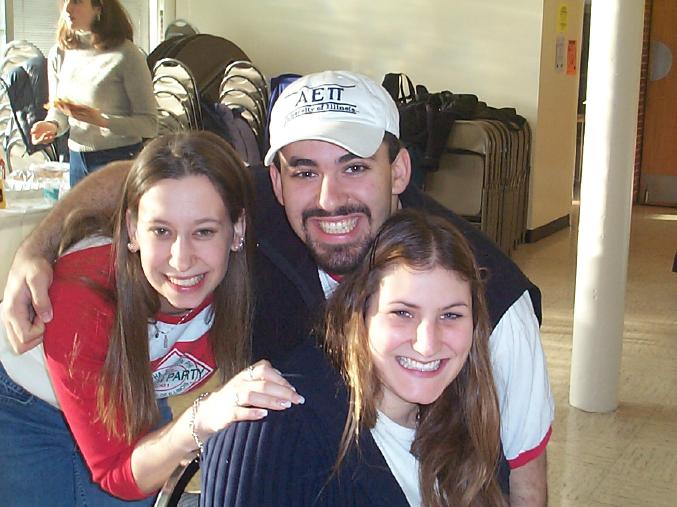
|
| Mara, Noah and Staci |
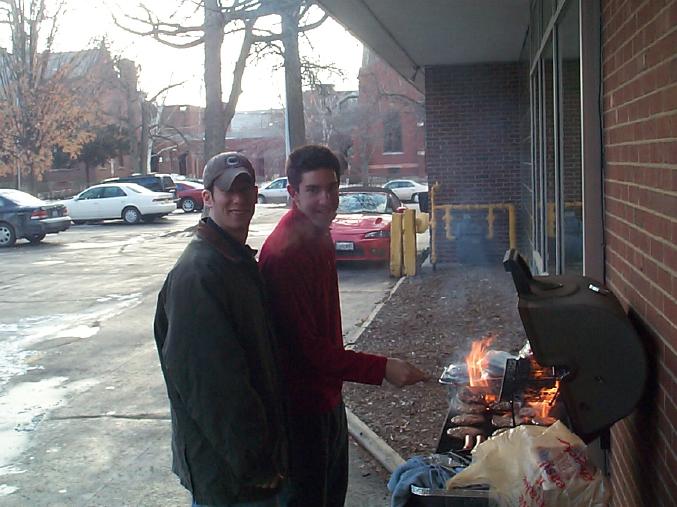
|
| Grill Masters Steve and Mike |
Win Fred Gottheils Money: It was first created to build bridges that had been formed between two fraternities. This year was the second time the program occurred. It further bonded the Jewish houses together, even without that being the goal. JGC had little involvement in the planning, for it was an independent project of many ZBT men, who wanted to recreate the program. Win Fred Gottheils Money is a scorn of Win Ben Steins Money with Fred Gottheil as the shows host. Student contestants try to outwit the professor in front of a large audience. Fred Gottheil is a well-known Economics Professor at UIUC, who really enjoys working with the students on different fundraising projects. The event was a success, raising $5000.00 towards The Josh Gottheil Memorial Fund for Lymphoma Research. Joshs fund was created in memory of Josh Gottheil, professor Gottheils son, who fought valiantly against cancer that took his life at age 19. Joshs Fund establishes grants to aid nurses directly involved in patient care in bone marrow and stem cell transplant units. The money raised by Joshs Fund goes directly to the Oncology Nursing Society of America who administers the grants. Joshs Fund is a not-for-profit organization.
At the door students bought $2.00 and $5.00 raffle tickets where they could win several prizes donated by local businesses. Many people also donated money directly to the fund.
This is a great program! Even though it takes a lot of work, it means a lot to the students who are willing to put forth the effort (with the right leadership). This requires good organization, many planning meetings and will only be successful if your role is as an advisor/supervisor. The students need to take on most of the planning and implementation of the program, for it to be a success; the role of the JCSC is only a supportive role.
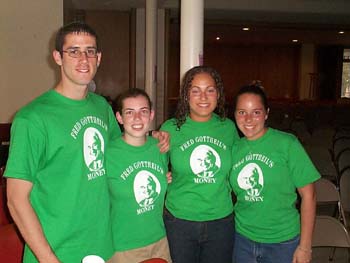
|
| Brad, Lauren, Sari and LIz |
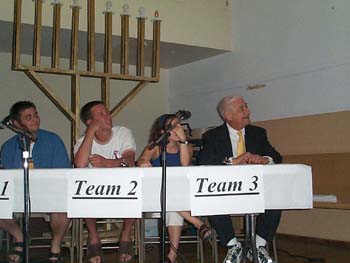
|
| The show |
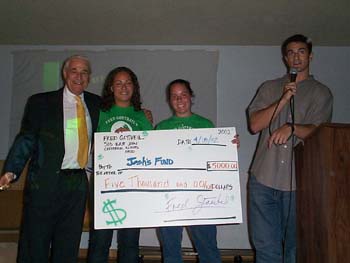
|
| HOO WEE and check for 5 Grand! |
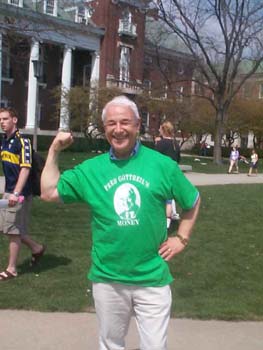
|
| Freddy G. in the flesh |
Sr. Greek Happy Hour: This is a program that FAILED BIG TIME! I think that it is important to recognize ones failures, and then learn from them. I wanted to have a group of seniors get together once every other week for drinks, with the idea that they could meet new people and network for their future. I decided that this was important because it seems that after ones freshman year the rate of meeting new people almost exponentially declines. I advertised this event with flyers in the houses, emails and announcements. No one came to any of the scheduled Happy Hours. I believe this was for several reasons: Seniors dont generally hang out at their houses or even attend meetings; people generally will not attend any programs they are not familiar with; and will rarely attend something just by hearing about it. I learned that when I create a program, it is necessary to seek the advice of students, personally invite them to attend and gauge a number of people you should expect to attend, so to not feel disappointed if the numbers are low. Most importantly, DO WHAT THE STUDENTS WANT TO DO! You are there for their benefit, so appeal to their interests.
Shabbat To-Go: Hillel already has a Shabbat to go program that prepares all the Shabbat necessities, including food, and packages them together for the student to pick up and either celebrate Shabbat on their own or with friends. The Shabbat To-Go package has been tailored to the Greek houses, in which the JCSC fellow brings the food, grape juice, challah, candles and booklets to the house. Someone from the house can lead different parts of the dinner service and then everyone enjoys a traditional Shabbat meal. The students particularly enjoy the familiar matzo ball soup and kugel, just like mom used to make.
Freshman Ice Cream Social: In the Fall the JGC hosted an Ice Cream social at the AEPhi house so the freshmen could meet each other in a sober environment. It was a fairly easy program to plan. It was important for the freshmen to help plan especially with advertising, in order to attract their peers. The girls were mostly involved in helping; in fact one even sent instant messages to all the people on her buddy list. I went to Sams club to purchase the ice cream and toppings, and it was served buffet style. It is important to contact the new member educators and the pledge masters, because they will be able to help in publicity, as well as attendance.
There were some things that I did that are not programs:
Every Friday from 11-1 AEPhi hosts a bagel bar buffet lunch, where there are always MANY people eating. I would go over to eat with the students (it is a great way to meet people and have conversations) or make some announcements about upcoming programs.
In the fall, the fraternities compete in football games among each other (SAM and ZBT, PiLam and AEPi). They take this VERY seriously, appointing coaches and regurally-scheduled practices. This tradition has created tremendous rivalries, which JGC and Win Fred Gottheils Money strive to mend. I brought a cookie cake and Gatorade to each of their practices, and was well received. Additionally, at each game, I brought bottled water to distribute. Each bottle had a Hillel/JGC sticker on it, advertising an upcoming event or our website. This is also great to do during the SDT vs. AEPhi Broom ball game in the spring. Instead of water, I brought hot chocolate with stickers on the cups.
During finals, I would schedule a time at each house to bring them study snacks and stress relief activities. I would usually order pizza, just because that was easiest, but it wouldnt make much of a difference if I brought something else. Some Stress relief things I did were making stress balls, finger paint, make a dreidle out of clay, decorate and create a menorah (it was Chanukah time). The biggest hit of all was the spin art machine that I bought. It became a CRAZE! I had people come in to Hillel to make spin art even after the semester ended. Most of the houses have study snacks scheduled at their house, I suggest bringing stuff on the off days. AEPi has Study snacks called Spreads. It happens at 12AM, and is a sight to see, definitely worth staying up for. That is all I will say about that.
I put together Rosh Hashanah and Purim baskets, and brought them to all the houses. Each basket appropriately symbolized the holiday, and was complete with information about the holiday, and the times and flyers of other (Hillel) activities. For Rosh Hashanah, I had an apple and honey theme, and on Purim, I made an effort to buy foods that begun with the letters P, U, R, I and M.
During Sukkot, the AEPi men build a Sukkah at their house. I brought over candy (for energy) and stuff to decorate the Sukkah. They made a paper chain! It was a great bonding opportunity.
Lastly, I would often stop by the houses at lunch and dinnertime, not always to make a dinner announcement, but also chill with the members and eat a free meal. It was a good way to see the people I already knew and meet their friends.
Helpful websites: http://www.illinigreeks.com, http://www.uiuc.edu/ro/panhellenic
SDT: http://www.sigmadeltatau.com, http://www.uiuc.edu/ro/SDT/
AEPhi: http://www.aephi.org, http://www.uiuc.edu/ro/aephi
AEPi: http://www.aepi.org, http://www.uiuc.edu/ro/aepi
SAM: http://www.sam.org, http://www.gsfranchi.com/sammys
PiLam: http://www.pilambdaphi.org, http://www.uiuc.edu/ro/pilams
ZBT: http://www.zbt.org
Strategies for success: I have included most of what I think would be successful in each section. I would like to reiterate that listening to the students and their desires and making yourself available to them in a friendly manner would help greatly. Additionally, Greeks dont like to be stereotyped. If you have had a bad experience in the past with Greeks, dont assume that they are all the same. Many people look negatively upon the Greek system, DONT BE ONE OF THOSE PEOPLE!
Goals for the future: I would like to see more programming done in different houses as well as a more independently functioning JGC.
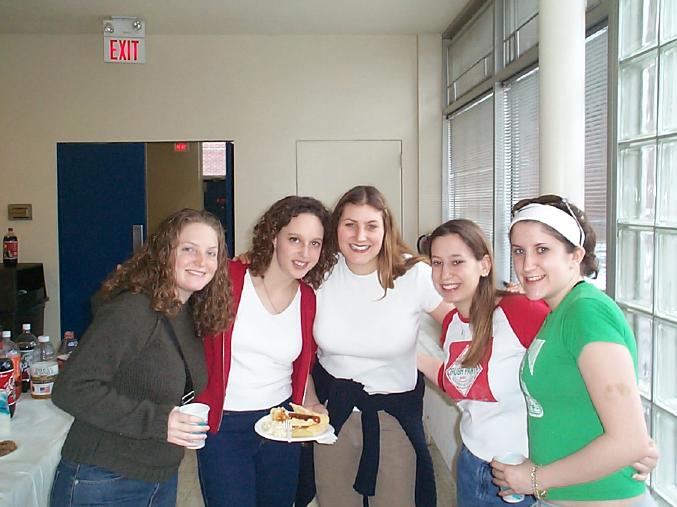
Helpful Greek Terms:
Active: A woman who has been initiated into lifelong sorority membership.
Alumna: An initiated sorority member who has graduated from college.
Atius-Sachem Mom's Day Sing (Atius): A variety show held during Mom's Weekend each year. Sororities and fraternities pair up, prepare a short musical, and try out for the show. The event is sponsored by Atius (a sophomore honorary) and Sachem (a junior honorary).
Bid: A formal invitation given to a potential new member to join a sorority.
Chapter: The local group of a national sorority.
Exchange: A theme party between a sorority and fraternity.
Football Block: A sorority and fraternity sit together to cheer on the Fighting Illini. A cookout usually precedes or follows the game.
Initiation: A formal ceremony through which new members become active members of a sorority.
Interfraternity Council (IFC): The inter-fraternity programming and governing body; the fraternities' equivalent of Panhellenic Council.
Legacy: A woman whose mother, sister or grandmother is an active member or alumna of a sorority.
Limited Contact: Designated time periods before and during formal Recruitment during which there is limited communication between sorority members and potential new members. This limitation ensures fair recruitment.
Open-Air Dorms: Sleeping accommodations for sorority members who choose not to sleep in their rooms - usually a large room of bunk beds on the top floor of the chapter house.
Panhellenic Council: The inter-sorority programming and governing body.
Philanthropy: A charitable fund-raiser or service project sponsored by a sorority or fraternity.
New Member: A woman who has accepted a sorority's bid for membership but has not been initiated.
Quota: The maximum number of new members a sorority may accept through Recruitment.
Recommendation: A written letter sent by an alumna recommending a woman for membership in a sorority.
Potential New Member: A woman who is participating in Recruitment.
Recruitment Counselor: A sorority member who leads a Recruitment group through the stages of Recruitment. She is unbiased and is willing to honestly answer any questions about sororities and Recruitment.
Sister: A term used by sorority members to refer to one another.
Check out these interesting facts about Greeks!
Greek Statistics
85% of Fortune 500 executives are Greek
Of the nation's 50 largest corporations, 43 are headed by fraternity men
76% of U.S. Congressmen and Senators are Greek
All but two U.S. Presidents and two Vice Presidents since 1825 have been Greek
85% of the U.S. Supreme Court Justices since 1910 have been Greek
63% of the U.S. President's cabinet members since 1900 are Greek
A U.S. Government study shows that over 70% of all those who join a fraternity/sorority graduate, while under 50% of all non-Greek persons graduate
Greeks compose approximately 19% of the U of I student population
Greeks hold the majority (75%) of leadership positions on campus
62% of fraternity and sorority members are involved with at least one student organization outside of their chapters
76% of the members in class honoraries are Greek affiliated
|
|

ISRAEL:
What is IlliniPAC?
IlliniPAC stands for Illinois-Israel Public Affairs Committee. It is a pro-Israel political group whose focus is on educating Congress and the campus community on the importance of a strong U.S.-Israel relationship. This is done through informative booths on the main quad, and lecture series with various Politicians and recognized experts on the situation in the Middle East. IlliniPAC has been one of the most forceful Jewish organizations on our campus in the past. Sponsoring events such as voter registration, speakers, conferences, and more, Illinipac is on the forefront of political activity in Champaign.
IlliniPAC website: http://www.uiuc.edu/ro/israel
What is Tagar?
The Tagar Campus Zionist organization is a chapter of the International Betar Zionist Youth Movement. Tagar is active in promoting Israel on campus. By Inviting speakers, organizing solidarity rallies and other events on campus Tagar seeks to educate the campus about Zionism. Tagar also organizes conferences as well as trips to Israel. Tagar is mostly self running and only utilizes Hillel for support and its building space, thus I dont work closely with Tagar.
The Tagar Zionist Student Activist Movement is a strident voice for Zionist and Jewish activism at colleges and universities around the world. The movement was founded in 1983 as an expansion of the Betar Zionist Youth Movement, which itself was founded by Zionist visionary Ze'ev Jabotinsky in 1923. The name itself comes from a Hebrew word that was used by Jabotinsky to connote "the spirit with which one takes on a challenge."
The original students who founded Tagar were spurred on by the increase of anti-Israel activity and propaganda on the campuses during the Lebanon war. Today, countering anti-Israel propaganda and fostering a positive image of Israel remains on of Tagar's most important activities. (Taken from the Tagar Website)
Tagar website: http://www.uiuc.edu/ro/tagar
The IlliniPAC leadership, this year, had a rocky beginning, however the year ended successfully, with a slight restructuring.
President: Diana Greyz Greyz@uiuc.edu
Treasure: Shoshana Hindin Hindin@uiuc.edu
Secretary: Vita Ryvkin - Ryvkin@uiuc.edu
Helpful names: Dahlia Weinberg dweinbrg@uiuc.edu
Tamar Binyamin tbinyami@uiuc.edu
Shachar Luz Luz@uiuc.edu
Programs:
Campus Booths: IlliniPAC sponsored two tables this year on the quad. In the fall they created an Anti-terror table, with a poster that linked terror to a global network. It was a display of countries that are victims of terror and those countries that harbor terrorist organizations. It received a lot of people, who expressed positive and negative opinions of the table. It was also in the DI. In the spring, on the last day of classes, they put together a table to remember specific victims of Palestinian suicide bombers and attacks. The goal was for other students to realize that these people all have a story, a life and a face. Both tables were a success, incited people to think about things differently and attracted many visitors.
Speakers: IlliniPAC hosted a variety of speakers this year from Keith Weissman, the deputy director of AIPACs Foreign Policy Issues department, to Neil Lazarus who trained students in Israel advocacy (see http://www.awesomeseminars.com). They also hosted a variety of politicians such as U.S. Rep. Tim Johnson (IL-15) and Ambassador Dennis Ross (http://www.harrywalker.com/speakers_template.cfm?spea_id=453). Dennis Ross was the central focus of this year, and the largest effort of the group. He is a high profile and costly speaker, thus it took the students many months to raise the money to bring him to Champaign. He spent the day with us; spoke at the Law School, had dinner with select students and later that evening filled the lower floor of Foellinger Auditorium (600+ people).
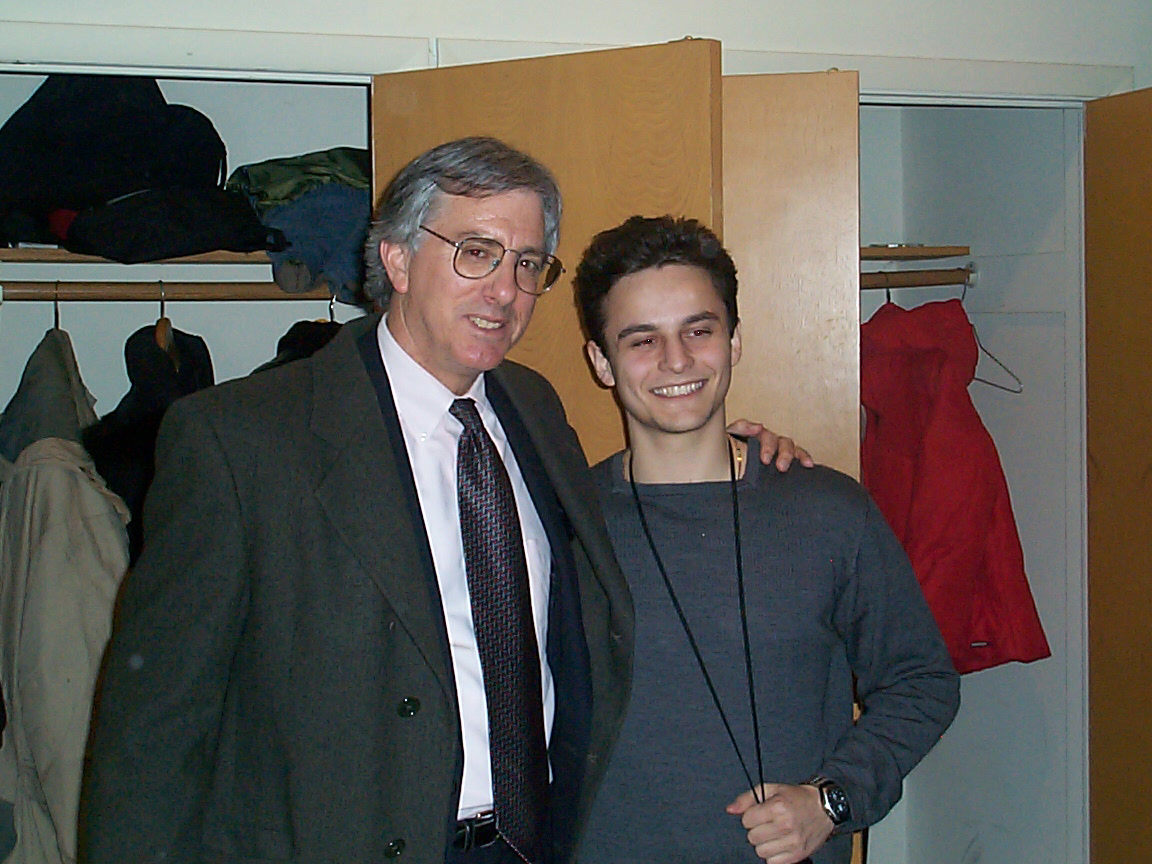
|
| Amb. Ross and Gene |
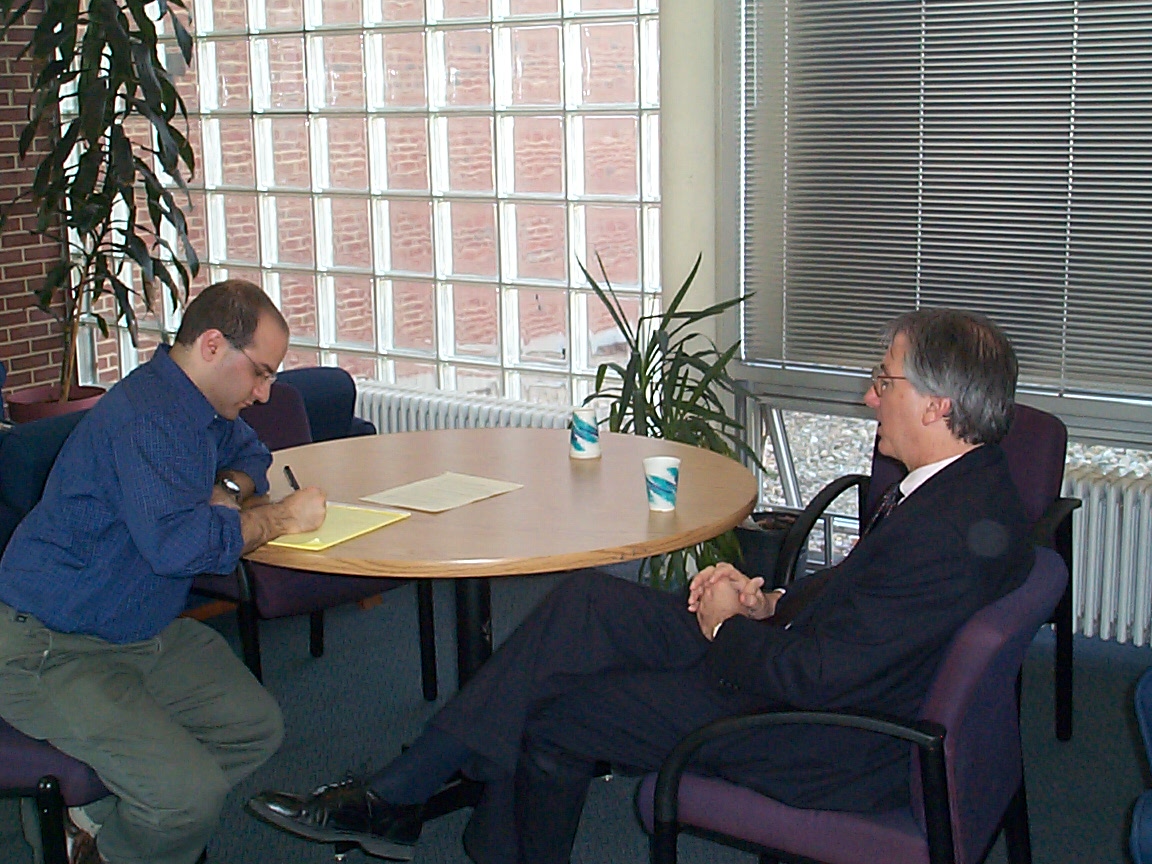
|
| Tsoni interviewing Amb. Ross |
Classes: IlliniPAC developed a series of informal classes to better educate students on the historical background of Israel and further the understanding of current political issues. Each class begun with a guest expert lecturing followed by a discussion that was student facilitated. These classes often attracted 10-20 people, most of who were somewhat familiar with the topics already. It was created to better inform the mass of Jewish students who lacked the knowledge to get involved in any Israel focused conversation. Even though it didnt completely reach its target audience, it had great potential, with a more thought out advertising strategy and curriculum. This was the first time the class was conducted, so it can only improve.
Yom HaAtzmaut: We had difficulty planning our Yom HaAtzmut activities this year, because of counter protests that occurred in the past causing our students to feel unsafe. We held several planning meeting in which we mostly discussed what would happen on that day. We swayed back and forth between not having anything to having a Rally on the Quad. When many students expressed their desire not to participate in anything confrontational, we finally settled on a celebratory picnic on the Quad with a brief (10 min) unity circle that had one speaker, a reciting of the Prayer for the State of Israel and singing of the song Salaam. This was a perfect combination! It was a distinct statement that both Jews and non-Jews were celebrating Israeli Independence Day, with blue and white balloons columns, Israeli live Music, and dancing, while simultaneously it was a fun event that people could attend and participate, as they desired. It was important that we used space to our advantage, for in the past we had been cornered and that is the reason people felt threatened. In the Middle of the Quad, there was a lot of free area around us. Some people were playing Frisbee, some were eating lunch and others were just talking. It was exactly what Yom HaAtzmut is supposed to be a celebration.
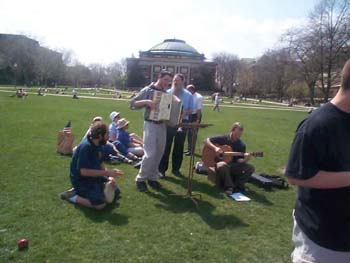
|
| Music on the Quad |

|
| Dancing to the Music |
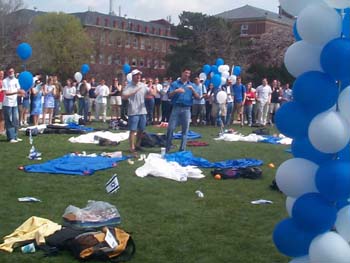
|
| Judd and Bob in the Circle |
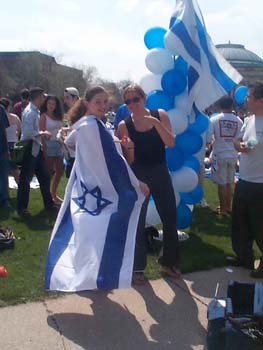
Teach-In: Elana and I created a brief historical overview of Israel, and hosted a Teach-In at Hillel right before Yom HaAtzmut. It was a program designed for someone who had little time but wanted to learn the very basics. The Teach-In lasted an hour and very few people attended, however those who did attend remarked about how helpful it was. With a bit more organization, I would like to see this program develop into a portable seminar that can be conducted at Greek houses, Dorms and even personal apartments, in order to better educate students about Israel and increase their interests.
Pro-Israel Rally in Washington D.C: On April 15, 2002, a number of American Jewish organizations held a rally on the steps of the US Capitol building in Washington, DC to show support for Israel. The rally took place against a backdrop of increasing violence between Israelis and Palestinians in the Middle East. We took a bus full of people (55), who drove 13 hours each way to attend this rally. It was a great experience for all. Checkout some articles online about the Rally:
http://www.washtimes.com/metro/20020416-61195630.htm
http://www.washingtonpost.com/ac2/wp-dyn?pagename=article&node=&contentId=A56773-2002Apr15¬Found=true
Helpful websites:
Jerusalem Post: www.jpost.com
Arutz Sheva: www.israelnationalnews.com
Ha'aretz: www.haaretzdaily.com
AIPAC: www.aipac.org
New York Times: www.nytimes.com
Israel's Ministry of Foreign Affairs: www.mfa.gov.il
Israeli Embassy in Washington D.C.: www.israelemb.org
Israeli Consulate in Chicago: www.israelemb.org/chicago
Strategies for success: I think that the problems I encountered with the IlliniPAC leadership will not occur this coming year. Diana is an amazing woman, truly dedicated to her cause. I think that the board that has been recreated will work diligently and creatively to improve Israel programming on campus. I would suggest being creative for most of the programs we had, lacked creativity.
Goals for the future: I would like to see a great continuity of leaders. The turnover is so great year after year that the group always takes a while to get going. Additionally, I think that leaders with more clearly defined roles would benefit the organization. IlliniPAC was once a really active political group and in the past few years their activity level on campus has really declined. It is important that next year they are on campus ALL THE TIME (have a table at least 2 times a week), have passionate, educated and vocal Israel advocates engaging people in conversations on campus as well as reaching out to build support for their group and build membership. This will only occur if there is a more expansive Israel educational campaign, aimed at drawing supporters.
|